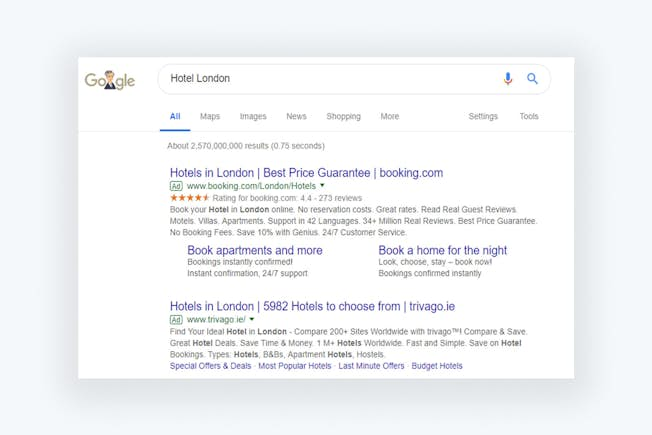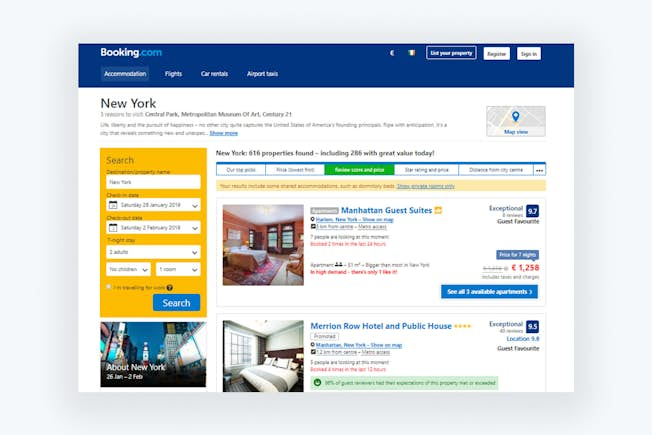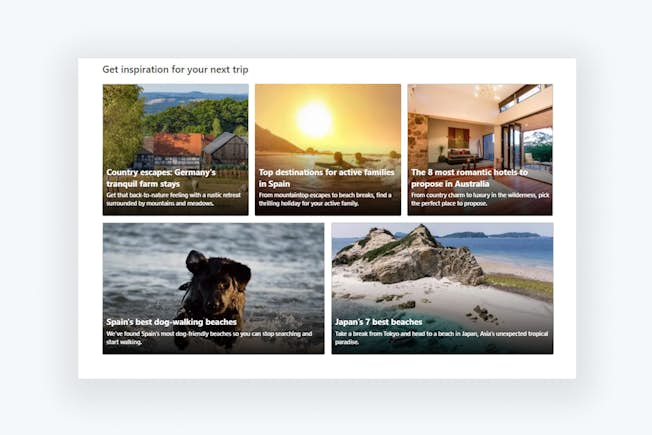Booking.com, the fare aggregator website and metasearch engine, has become a major global player in the travel and tourism sector over recent years.
The online travel agency (OTA) is turning over billions of dollars in annual revenue, with millions of accommodation listings worldwide, and has been growing impressively.
And while the numbers are of upmost importance, the power of the brand has a value well beyond that – Booking.com is front-of-mind for many consumers when they sit down to make travel plans and ultimately click through to reserve rooms.
Of course, this is all achieved in large part through marketing strategy, using both digital and traditional channels. While these marketing activities are clever and well executed, they also involve a heavy financial investment on the part of the marketers and management.
Here, we will examine some of the tactics and marketing channels utilized by Booking.com to achieve such a prominent and profitable position in the industry, and look at recent developments within this, as well as some of its major competitors.
The Business Model
Booking.com is owned and operated by US-based Booking Holdings, although it is headquartered in Amsterdam. In addition to Booking.com, Booking Holdings owns and operates several other travel fare aggregators and travel fare metasearch engines including Priceline.com, Agoda.com, Kayak.com, Cheapflights, Rentalcars.com, Momondo, and OpenTable.
Booking Holdings reported gross travel bookings during 2017 of a staggering $81.2 billion, a 19% increase compared to 2016, and gross profit of $12.4 billion, a 21% increase. As the largest brand in the group, a significant proportion of that revenue is derived from Booking.com.
As the company itself does not own or operate hotels, and doesn’t even charge customers a booking fee, how does it actually make money? The answer is by charging the hotels a percentage of the booking price, so they earn money whenever a hotel gets a successful reservation through their platform. That might sound like a bad deal for hoteliers, but it helps them boost bookings and revenues.
A real strength of this model is the consumer’s satisfaction from not paying a fee to complete their reservation, as well as the peace of mind offered by the “best price guarantee” slogan that goes along with the online messaging. It’s an effective approach, but in such a competitive sector, winning marketing strategies are required first and foremost to bring in the customers.
Search Marketing Strategy
Booking.com, along with it sister companies, spends heavily on pay-per-click (PPC) advertising through Google Ads. That means billions of dollars! Booking.com and its sister companies were the top spender in the travel and tourism category for Google Ads in 2016.
Even from the lay consumer perspective, the scale of the investment here becomes obvious – a quick Google search for common travel and tourism keywords and phrases often brings the site up as the number 1 result.
By searching for terms such as ‘Hotel London’, ‘Hotel Paris’ and ‘Find Hotels’, Booking.com came in the top spot each time. See the Booking.com result for ‘Hotel London’ in the screenshot below, followed by Trivago:

So, Booking.com has a massive focus on driving traffic through paid search, which is perfectly logical, given that so many people conduct their research and make bookings with Google as their starting point. This is not so much concerned with spreading the brand message, rather it is generating traffic based on keywords and phrases which already show intent, i.e. these consumers are making travel plans and are likely to book.
They also utilize organic search very well, with search engine optimization (SEO) specialists working on the website’s content and design to ensure it brings in high volumes of traffic, again with a big emphasis on the most important keywords. From a design perspective, Booking.com is strong on user experience (UX), as it has a simple interface for carrying out multiple searches quickly, and is visually appealing, with images displayed for accommodation throughout. It is actually a comprehensive search engine in its own right.
Check out these search results for accommodation in New York as an example:

Content Marketing and Social Media
Despite the effectiveness of their search marketing activities in driving traffic, PPC comes with one major caveat – it costs a lot of money! As well as that, it does not necessarily serve to build brand loyalty, another key marketing goal.
Therefore, rather than relying on search marketing too heavily, Booking.com are also now turning their focus to other areas to increase brand recognition and loyalty. This can of course boost revenue, while also driving down their customer acquisition cost (CAC). Over the last couple of years, they have been striving to build more brand emotion with customers through content, social media channels, and TV advertising.
They publish regular articles on their website, piquing the interest of those researching their next holiday, and providing useful information and tips for those who may be closer to a purchasing decision.
Here is a sample display of some of their recent articles:

This theme continues on Booking.com’s social channels. Their Facebook page, with a following of over 14 million, often posts these articles, which again helps to bring more traffic back to the site. Their YouTube channel features an extensive bank of relatively short travel videos, and they are also building up their profile on Instagram, with close to a million followers.
The pivotal role of content creation and distribution is certainly not ignored by the marketing team at Booking.com. Permeating through all of this content, on the website itself and on the social channels, is a consistent brand tone, which we will look at next.
Brand Tone and TV Advertising
It certainly is not easy for an OTA to build strong brand loyalty through emotional appeal. In this case, the obvious big selling point of the service is competitive pricing and a huge selection of accommodation within one site – offering value, convenience, and a sound, simple UX within the site itself. With those elements as a base to build upon, Booking.com has moved its focus (both in terms of strategy and budget) more towards emotional appeal.
This follows a broader trend, particularly within content marketing, where the storytelling, experiential aspect is emphasized. It is clearly seen in this brand’s marketing efforts of late, including a major investment in TV advertising, to boost brand awareness and loyalty. As they do not own their own hotels, and need to capture broad appeal due to the scale of their operations, this storytelling and emotional element is challenging, but has been cleverly developed and executed.
A good example of this is the mission statement on Booking.com’s Facebook page, which reads as follows: “To help leisure and business travellers, whatever their budgets, easily discover, book, and enjoy the world’s best places to stay.” This seems a simple message, but it actually contains a good deal of information and conveys goodwill towards the customer.
The website content, along with the social channels, develop this further, catering to a variety of different travel interests, all boosted by strong and appealing use of imagery throughout.
This is especially evident on the YouTube channel, which contains a host of videos shot by Booking.com employees and customers – an eclectic mix of real travel experiences, brought to life through the power of personal storytelling. These emotive, interesting little stories demonstrate a connection between travelers, hotel staff, and the Booking.com brand itself, with a sense of adventure very much to the fore.
Here’s one great example of emotive storytelling from the channel: https://www.youtube.com/watch?v=pDKOOB8MUxs.
And the brand has significantly increased its spending on TV advertising in the last year or so. This investment spreads the brand message even more widely, reaching a massive audience through the most influential traditional channel. Of course, the metrics are more difficult to track here, in terms of traffic generated and return on investment, but this could be a game-changer in terms of brand recognition and emotional appeal.
Booking.com has rolled out TV ad campaigns in the US, UK, Germany, and other major global markets. The humorous element is particularly strong with the TV ads, such as this one, again building audience curiosity, and the widely used “Booking.com: Booking.yeah” slogan captures this funny tongue-in-cheek tone of the ads brilliantly.
That creative messaging, which promotes the website without aggressive sales tactics, is attention-grabbing and certainly has potential to be developed further by the brand.
Bringing It All Together
Having built much of its traffic and revenue on the strength of paid search marketing, Booking.com enjoys a very healthy market position, sitting among the elite global players in the travel industry. The website itself offers customers a great UX, good value, and an enormous selection of accommodation.
On top of this, they have invested heavily and made much progress in building a brand which is well trusted, interesting, and globally recognized. They have achieved this through a comprehensive content strategy and strong TV advertising campaigns.
Travel and tourism is a very competitive industry, particularly in the digital space. Expedia and other major players also have a huge global presence, and Airbnb is a massive disruptor with a presence all over the world.
However, with ongoing strategies and campaigns that are hitting the right tones, Booking.com looks like it’s going nowhere for some time to come.
Upgrade to Power Membership to continue
your access to thousands of articles, toolkits, podcasts, lessons and much much more.
Become a Power Member- Login
- View Courses
- - - -
- Courses
- Resources
- - - -
- My Account
- Change Password
- Logout





